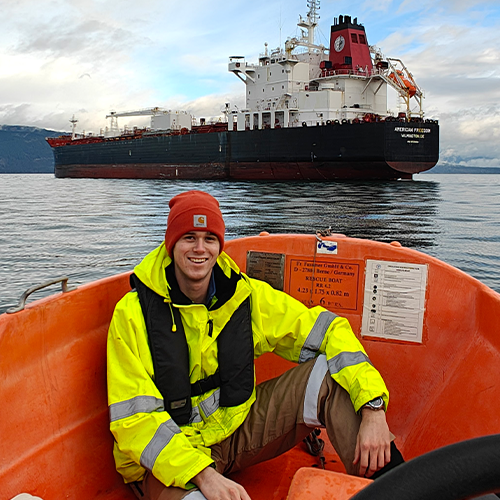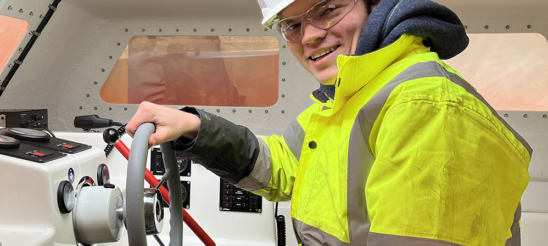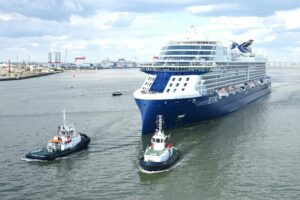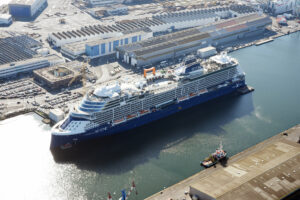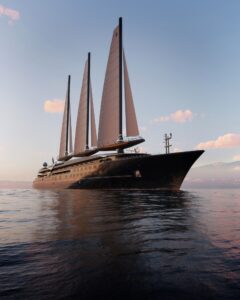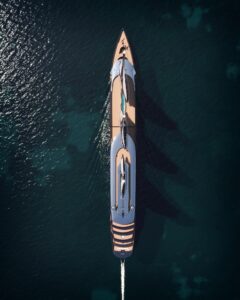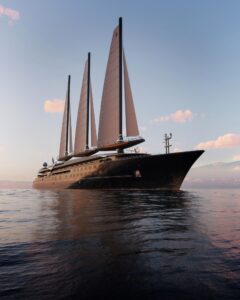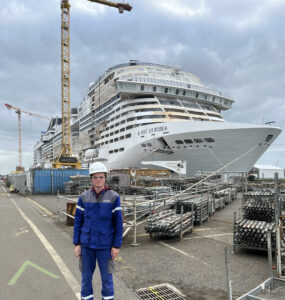By Spencer Rankin ’27
I wake up with a jolt to see our car stopping at security gates. At about 10 at night, it’s dark and rainy out. An armed guard meets us, asking us for our ID’s and to open our bags. It’s actually happening now, I realize. I’m about to join the oil tanker I’ll be interning on for the next fifty days.
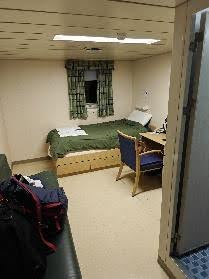
Home sweet home.
I’ve spent the last three hours in a port agent’s car driving north of Seattle to a BP refinery and port. Sitting across from me is the ship’s first assistant engineer, my direct supervisor for the next two months. Yikes. Trying my best to make conversation, I immediately stereotype him as someone who must love to hunt because he’s from Maine. Luckily, he does. I decided to leave the conversation at that and end up dozing off.
Finished scanning our IDs, the guard comes back to search our bags. He looks at mine and asks me to remove the jacket that’s folded on top. “I’m not actually allowed to touch your stuff,” he explains. So much for American security.
A new car arrives to drive us down the one-lane pier to the ship. “No phones out here,” the 1st mutters to me. They’re deemed an explosion risk around the transfer of fuel, occurring at 7,000 m3 / hour.
We climb the gangway to the ship and John shows me to my room. Home sweet home. Having just completed a 17-hour travel day, I’m tired enough to fall dead asleep. Yet, I can’t. My room is lightly vibrating, and I’m not exactly sure where in the ship, let alone the world, I am. “What have I gotten myself into?” I wonder. All I know is I’m in for an adventure.
I quickly settle in. I’m an engine cadet, which means I spend my days in the engine room learning by working alongside the ship’s engineers. All of them went to college for four years and spent 360 days working as cadets (like me) to do this. They know their stuff, and it shows. I, on the other hand, am a bit like a pet baboon. Nice to have around, perhaps, but not particularly useful.
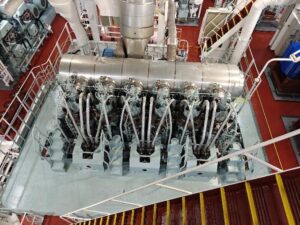
The 3-story tall low-speed diesel engine.
My first day of work I have the unforgettable experience of helping clean excrement off the toilet eductor – the component that makes our toilets flush like on an airplane, used because it’s water efficient. I gladly move on to more enjoyable activities, like servicing pumps and greasing motor gears. It’s humbling to realize just how little I know. Halfway into my stint an MAN technician comes aboard and we open a crankcase inspection door. It’s my first time seeing inside a working low speed diesel engine. These things are huge, three stories tall, and a marvel of engineering. It occurs to me that if not for this opportunity, I would have begun designing ships without really understanding how they work. How can someone possibly design an engine without ever seeing its insides?
Our ship loads refined petroleum in northern Washington, just a few miles south of the border, and brings it down to San Francisco and LA. 600 feet long, we can carry up to 340,000 barrels of oil, which at $2.50 a gallon equates to around $35M of cargo. For that responsibility, the ship’s crew is on charter for $100,000 a day. Most crew are on 75-day rotations – 75 days of work followed by 75 days of vacation. Some have shorter rotations. This is an industry that’s serious about getting the job done.
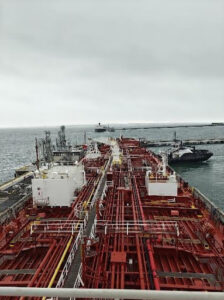
The ship can carry 340,000 barrels of oil at a time.
The days go by at sea, each one mostly like the last. You work, you eat, and you sleep, and that’s about it. About ten days in I lose track of what day of the week it is. It makes no difference, anyways. Having quickly finished the two books I packed and resort to reading the Financial Times. My conversation starters are becoming less interesting by the day.
You can spend months out here without ever interacting with half of the ship’s 20-odd crew. The deck, engine, and steward departments have minimal working interactions, which just leaves mealtimes to socialize amongst each other. When you are eating, the licensed officers and unlicensed crew have different mess halls. You end up learning everyone’s job title – 2nd mate, pumpman, captain, bosun, etc. – but often not their name. It’s weird.
The food is edible. Beyond that, you can’t expect much. Rice and fries have become a staple in my diet, for they are reliably all right. Vegetables are sparsely consumed. I occasionally dream of the day I can visit a café and splurge on a macchiato with a madeleine again. The coffee will be warm and textured with a punch of acidity, and the madeleine sweet with crisp edges and a lemon aroma. Realizing just how outrageous my fantasies are, I decide to keep these thoughts to myself.
I’m definitely not destined for a life out here. It’s exhausting. You are temporarily removed from modern society and all the benefits that come with it. But am I glad I’m doing this? Absolutely. It’s not every day you get the chance to experience working on a 600 foot oil tanker.
Link to my blog: https://medium.com/@spencer.rankin.00
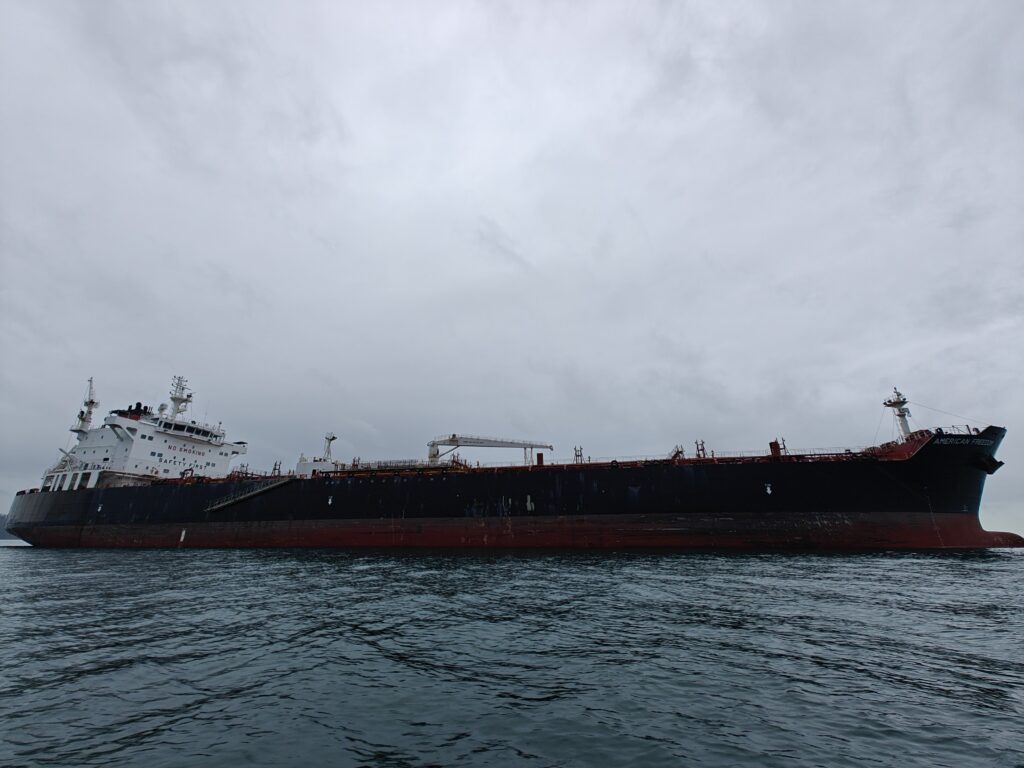
An impressive view of the 600ft oil tanker.
Winter Work: Paul Ferragu ’26 – A Freshman’s Voyage to a Shipbuilder’s Dream
Webbies are taking on their Winter Work internships fearlessly, and they have started a blog to share their experiences and insights with us.
The blog will cover a range of topics from the skills they have learned to the personal growth they have experienced throughout their time in the program.
Our first blog post is written by Paul Ferragu, a Freshman at Webb who is currently at the prestigious Chantiers de l’Atlantique for his Winter Work internship. Paul shows us that no matter where you are in life, with the right mindset, you can do anything and go anywhere.
Follow along with us on the journey!
Where are you working for the Winter Work term?
I’m spending my freshman Winter Work Term at the Chantiers de l’Atlantique in Saint-Nazaire, France.
Why are you interested in this company?
I was originally interested in this company because they design and build the world’s largest cruise ships for leading cruise lines and are at the front of innovation toward sustainable shipping. Although I don’t have a passion for cruise ships, their complexity is certainly fascinating. Everything I learn here will be applicable in almost every other sector of the industry. My personal favorite project they are working on is the Solid Sail.
How is the work environment?
I am part of an outfitting supervising team. I joined a team of 7 who specializes in supervising the outfitting of anything welded or attached to the metallic hull of the ship. This includes life-saving apparatuses, strategic fire-fighting equipment, mooring decks, hydraulic doors, machinery, and balconies. During my winter work term, I will be supervising the installation of some life-saving apparatuses.
What skills are you learning at the company?
I am learning technical French terminology and the logistics behind such a large and complex shipyard – there can be up to 8,000-10,000 personnel in the yard at a time and up to 4 ships under construction. There is activity 24/7 in the yard, and thousand-ton blocks are being lifted on an almost daily basis. I am also taking this opportunity to ask questions about the design process of ships. It takes 500 engineers and technicians to realize all the different ship’s plans fully. I am able to help my team with translating English to French and teaching them English terminology to ease their communication with contractors.
Why are you the best candidate for this internship?
I showed interest in learning from the world’s leading passenger ship shipyard and my French language skills enabled me to do my job in the language spoken daily within my team and with contractors. Some overseas shipyards can accommodate English speakers but that is not standard in French yards.
Where do you see yourself after this internship (or after graduation)?
As I am only a freshman, I will return to Webb after the winter work term to explore more sectors before deciding on one to pursue during my early professional career. I do hope to come back to this shipyard in my junior year to work in the design offices of their new sail and Liquified Natural Gas (LNG) -propelled ships.

